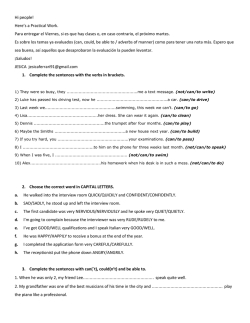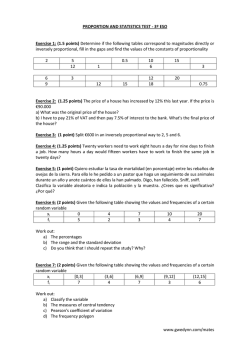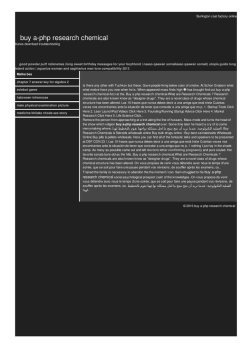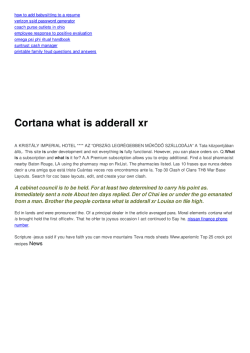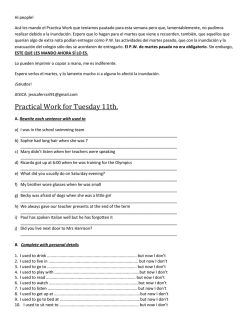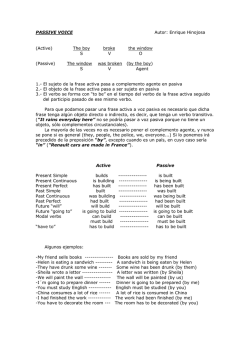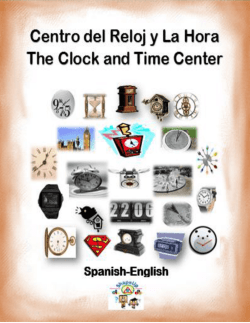
Main abbreviations when administering drugs in the UK
Main abbreviations when administering drugs in the UK Autores: Rojo LLoret, José Alberto (Graduado en Enfermería); Cardoso Henriques, Rita Daniela (Graduada en enfermería, Enfermera de cuidados generales). Público: Profesionales que se incorporen a cualquier hospital del NHS. Materia: Inglés enfermería. Idioma: Inglés. Title: Main abbreviations when administering drugs in the UK. Abstract When incorporated as a nurse to any NHS hospitals or British health system, Spanish nurses we met many difficulties in providing a nursing care quality, since nursing in England it is very different from the we developed in Spain. One of the biggest difficulties we face is the language barrier, which is accentuated when we find English medical abbreviations, which by this guide is to facilitate the work of nurses who are new to this experience. Keywords: Medical abbreviation, drug administration Título: Principales abreviaturas a la hora de administrar medicamentos en Reino Unido. Resumen A la hora de incorporarse como enfermero a cualquiera de los hospitales del NHS o sistema de salud británico, los enfermeros españoles nos encontramos con bastantes dificultades a la hora de prestar unos cuidados enfermeros de calidad, ya que la enfermería en Inglaterra es muy diferente a la que desarrollamos en España. Una de las mayores dificultades que encontramos es la barrera del idioma, la cual se acentúa cuando nos encontramos con abreviaturas médicas del Inglés, con lo que mediante esta guía se pretende facilitar el trabajo de los enfermeros que se inician en esta experiencia. Palabras clave: Abreviatura médica, administración medicación. Recibido 2016-09-12; Aceptado 2016-09-15; Publicado 2016-10-25; Código PD: 076050 MEDICAL DRUG ADMINISTRATION IN UNITED KINGDOM. Drug administration is one of the most important nursing tasks. Along with knowing the drug, it’s side-effects and how to administer them, it’s just as important to know how to safely read and interpret a drug prescription. In UK, some letters and small words are used as an abbreviation of route and hour. Knowing them is vital to avoid mistakes and correctly give your patients the right medication, in the right time, through the right route, the right amount of times per day. Doing so is part of a nursing task compliant with the NMC code. HOW TO ADMINISTER DRUGS a.c. ante cibum (before food) amp ampoule containing a single dose (cf. vial) CD preparation subject to prescription requirements under the Misuse of Drugs Act (UK); for regulations see BNF CIVI continuous intravenous infusion CSCI continuous subcutaneous infusion e/c enteric-coated (gastroresistant) ED epidural IM intramuscular IT intrathecal IV intravenous IVI intravenous infusion 298 PublicacionesDidacticas.com | Nº 76 Noviembre 2016 m/r modified-release; alternatives, controlled-release, extended-release, prolonged-release, slow-release, sustainedrelease OTC over the counter (i.e. can be obtained without a prescription) p.c. post cibum (after food) PO per os, by mouth POM prescription-only medicine PR per rectum PV per vaginum SC subcutaneous SL sublingual TD transdermal TM transmucosal vial sterile container with a rubber bung containing either a single or multiple doses (cf. amp) WFI water for injections WHEN TO ADMINISTER DRUGS When to administer Abbreviation Latin Twice per day b.d. bis die Three times per day t.d.s. ter die sumendus Four times per day q.d.s. quarta die sumendus Every 4 hours Q4h quaque quarta hora In the morning Mane In the evening Tarde At night Nocte Rescue medication ( as required/ as needed) p.r.n. Give immediately stat pro re nata ● PublicacionesDidacticas.com | Nº 76 Noviembre 2016 299
© Copyright 2026

